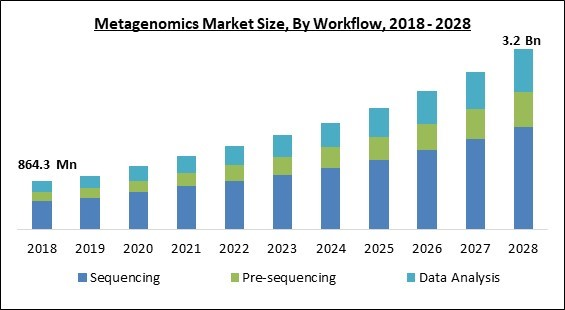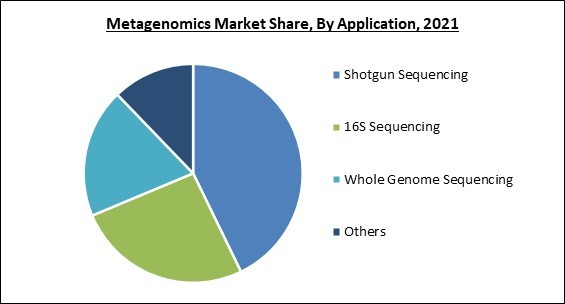The study of genetic material extracted directly from samples collected is known as metagenomics. This expansive field is also known as environmental genomics, ecogenomics, and community genomics. While conventional microbiology, microbial genome sequencing, and genomics rely on produced clonal cultures, the early environmental genetic analysis relied on cloning certain genes (typically the 16S rRNA gene) to generate a profile of variety in a wild sample.
It demonstrated that cultivation-based approaches have missed the large bulk of microbial biodiversity. Metagenomics has the potential to transform knowledge of the whole living universe as a result of its ability to uncover the hitherto hidden diversity of microorganisms. As the cost of DNA sequencing continues to decline, metagenomics now enables the investigation of microbial ecology on a much larger scale and in greater depth than ever before.
Recent studies use "shotgun" or PCR-directed sequencing to obtain largely unbiased samples of all genes from all sampled community members. The term metagenome referred to the concept that a collection of sequenced environmental genes might be studied similarly to a single genome. As a source of DNA, conventional sequencing begins with a culture of identical cells. However, early metagenomic investigations indicated that broad groups of microbes in several habitats could not be cultivated and hence cannot be sequenced.
Multiple 16S rRNA sequences that do not correspond to any known cultured species have been discovered, indicating the existence of numerous non-isolated organisms. These surveys of ribosomal RNA genes extracted directly from the environment demonstrated that cultivation-based approaches detect less than one percent of the bacterial and archaeal organisms in a sample. The discovery that the great majority of microorganisms were previously unrecognized is largely responsible for the growing popularity of metagenomics.
COVID-19 Impact Analysis
Since the emergence of COVID-19, important players in the life sciences and biotechnology industries have sought solutions for COVID-19 tracking, diagnosis, and treatment. The analysis of metagenomics is vital for the discovery and tracking of the virus. Diverse sequencing monitoring solutions and platforms are being implemented for efficient infection diagnosis. In May 2021, for instance, Oxford University and Oracle established strategic cooperation to develop a robust cloud-based genomic sequencing and analysis platform to reduce the risk of coronavirus infection. Due to the exceptional demand for COVID-19medication and vaccine discovery, economic activity in the metagenomics market is accelerating.Market Growth Factors
Constant Technological Advancements In NGS Platforms
Continuous technological advancements in sequencing techniques have enabled the development of efficient, portable, and user-friendly NGS platforms that are capable of delivering speedy and accurate results and have a reduced turnaround time. The introduction of such products and technology offers players an immediate competitive advantage; hence, leading companies are investing more in R&D to increase their market positions and shares. Many new bioinformatics tools have been added to the metagenomics market as a result of technical improvements, which have increased the market's revenue.NGS Data Analysis With Big Data
The amount of data generated during whole-genome sequencing is often at the terabyte level. For end-users of NGS-based metagenomic sequencing, data management is a significant challenge. Due to differences in data formats and the lack of an industry-wide standard for data output from different NGS platforms, data storage requirements can be rather complex. The application of big data technologies and AI for NGS analysis and workflow management has considerably boosted the yield of NGS runs. With developments in sequencing technology, the quantity of data collected during a sequencing run likewise grows.Market Restraining Factors
Constrained End-User Budgets In Developing Nations
Academic research and development are almost entirely reliant on financial support from other sources in nations that are still considered to be developing. NGS sequencers continue to be prohibitively costly even though the cost of NGS sequencing has come down. The NovaSeq 5000 and 6000 are Illumina's two most sophisticated sequencing systems, and their prices range from hundreds to tens of thousands of US dollars.Product Outlook
Based on the Product, the Metagenomics Market is segmented into Kits & Reagents, Sequencing & Data Analytics Services, and Software. The kits & reagents segment acquired the highest revenue share in the metagenomics market in 2021. It is because, during the experimental sample preparation phase of sequencing, a variety of chemicals are utilized. Established firms such as F. Hoffmann-La Roche Ltd, Thermo Fisher Scientific, and Illumina Inc. offer an extensive selection of reagents to meet the needs of sequencing.Technology Outlookk
On the basis of Technology, the Metagenomics Market is divided into Shotgun Sequencing, 16S Sequencing, Whole Genome Sequencing, and Others. The whole genome sequencing segment recorded a substantial revenue share in the metagenomics market in 2021. Whole genome sequencing, also known as whole genome sequencing, complete genome sequencing, and entire genome sequencing, is the method of determining all or almost all of the DNA sequences of an organism's genome at once.Workflow Outlook
By Workflow, the Metagenomics Market is classified into Pre-sequencing, Sequencing, and Data Analysis. The pre-sequencing segment registered a significant revenue share in the metagenomics market in 2021. Pre-sequencing considerations include a selection of library size, read duration and type (single or paired-end), and sequencing depth. Post-sequencing decisions consist of choosing pre-processing stages, a reference library, and a mapping technique.Application Outlook
Based on the Application, the Metagenomics Market is bifurcated into Environmental, Clinical Diagnostics, Drug Discovery, Biotechnology, Food & Nutrition, and Others. The environmental segment acquired the largest revenue share in the metagenomics market in 2021. The space for metagenomics research in agriculture and environmental protection is expanding fast. Metagenomics is a novel approach to comprehending microorganisms from a certain environment by sequencing analysis or gene screening.Regional Outlook
Region-wise, the Metagenomics Market is analyzed across North America, Europe, Asia Pacific, and LAMEA. The North America segment garnered the largest revenue share in the metagenomics market in 2021. This dominance can be attributed to the presence of major corporations in the region with increasing R&D funding and technological advances in sequencing. Collaboration between businesses and academic institutions is one of the region's most important business strategies.The market research report covers the analysis of key stakeholders of the market. Key companies profiled in the report include Bio-Rad Laboratories, Inc., Illumina, Inc., PerkinElmer, Inc., Thermo Fisher Scientific, Inc., Novogene Co., Ltd., Promega Corporation, Qiagen N.V., Takara Bio, Inc. (Takara Holdings Inc.), Oxford Expression Technologies Ltd., and F. Hoffmann-La Roche Ltd.
Strategies Deployed in Metagenomics Market
- Jun-2022: Oxford Nanopore unveiled a novel protocol for the rapid metagenomic characterization of DNA and RNA viruses. The protocol represents a simple metagenomic workflow that can be utilized to recognize DNA and RNA viruses. Moreover, this method has been applied in human clinical specimens to describe the pathogen presently known as the monkeypox virus.
- Jun-2022: Illumina completed the acquisition of IDbyDNA, a company producing metagenomic technology. Under this acquisition, IDbyDNA delivers a respiratory pathogen panel enrichment kit that recognizes more than 280 pathogens, including SARS-CoV-2, and more than 1,200 antimicrobial resistance alleles. Moreover, it operates on Illumina’s NextSeq 550 sequencing system and employs IDbyDNA’s Explify analysis software.
- Mar-2022: QIAGEN signed a two-year agreement with National Health Service, a publicly funded healthcare system in England. Through this agreement, Human Gene Mutation Database would be utilized at seven sites to help understand genomic data from next-generation sequencing. Additionally, NGS data from over 2.5 million clinical cases are now researched and diagnosed by QIAGEN Digital Insights solutions
- Nov-2021: Novogene introduced single-cell sequencing services. The service offers an on-site service for Novogene Japan K.K. to support consumers in optimizing their single-cell preparation work. Moreover, it delivers the flexibility for investigators to enjoy a reliable and hassle-free experience of an end-to-end sequencing solution for their single-cell analysis from experimental project design, library preparation, cell barcoding, bioinformatic analysis, and sequencing.
- Jun-2021: Illumina came into a partnership with Microba Life Sciences, world-leading technology for measuring the human gut microbiome. Together, the companies aimed to obtain Illumina’s revolutionary NGS tools and Microba’s high-quality proprietary gut microbiome analysis platform to develop the precise metagenomic data that researchers need to boost findings. Moreover, Microba Life Sciences is growing human health with new solutions produced from the human gut microbiome.
- Mar-2021: NovogeneAIT Genomics expanded its geographical footprint by establishing a single-cell sequencing lab in Singapore. This expansion includes a facility to deliver an entire end-to-end solution of the single-cell gene expression services such as single-cell experimental design, sequencing, data analysis, and single-cell capture. Additionally, the single-cell lab would deliver its services utilizing the 10x Illumina platforms and Genomics Chromium System.
- Mar-2020: Illumina formed a partnership with IDbyDNA, a metagenomics technology enterprise. Through this partnership, the companies aimed to boost NGS adoption for clinical infectious sickness testing.
- Oct-2019: Novogene expanded its geographical footprint by increasing its capacity to Cambridge Science Park. This expansion contains plant and animal genome sequencing, metagenome sequencing, human genome sequencing, transcriptome sequencing, and lanes sequencing. Moreover, the Novogene Cambridge Sequencing Centre is now able of performing more than 280,000 human WGS analyses every year.
Scope of the Study
By Workflow
- Sequencing
- Pre-sequencing
- Data Analysis
By Product
- Kits & Reagents
- Sequencing & Data Analytics Services
- Software
By Technology
- Shotgun Sequencing
- 16S Sequencing
- Whole Genome Sequencing
- Others
By Application
- Environmental
- Clinical Diagnostics
- Drug Discovery
- Biotechnology
- Food & Nutrition
- Others
By Geography
- North America
- US
- Canada
- Mexico
- Rest of North America
- Europe
- Germany
- UK
- France
- Russia
- Spain
- Italy
- Rest of Europe
- Asia Pacific
- China
- Japan
- India
- South Korea
- Singapore
- Malaysia
- Rest of Asia Pacific
- LAMEA
- Brazil
- Argentina
- UAE
- Saudi Arabia
- South Africa
- Nigeria
- Rest of LAMEA
Key Market Players
List of Companies Profiled in the Report:
- Bio-Rad Laboratories, Inc.
- Illumina, Inc.
- PerkinElmer, Inc.
- Thermo Fisher Scientific, Inc.
- Novogene Co., Ltd.
- Promega Corporation
- Qiagen N.V.
- Takara Bio, Inc. (Takara Holdings Inc.)
- Oxford Expression Technologies Ltd.
- F. Hoffmann-La Roche Ltd.
Unique Offerings
- Exhaustive coverage
- The highest number of Market tables and figures
- Subscription-based model available
- Guaranteed best price
- Assured post sales research support with 10% customization free
Table of Contents
Companies Mentioned
- Bio-Rad Laboratories, Inc.
- Illumina, Inc.
- PerkinElmer, Inc.
- Thermo Fisher Scientific, Inc.
- Novogene Co., Ltd.
- Promega Corporation
- Qiagen N.V.
- Takara Bio, Inc. (Takara Holdings Inc.)
- Oxford Expression Technologies Ltd.
- F. Hoffmann-La Roche Ltd.
Table Information
| Report Attribute | Details |
|---|---|
| No. of Pages | 273 |
| Published | October 2022 |
| Forecast Period | 2021 - 2028 |
| Estimated Market Value ( USD | $ 1304 Million |
| Forecasted Market Value ( USD | $ 3184 Million |
| Compound Annual Growth Rate | 13.6% |
| Regions Covered | Global |
| No. of Companies Mentioned | 10 |










